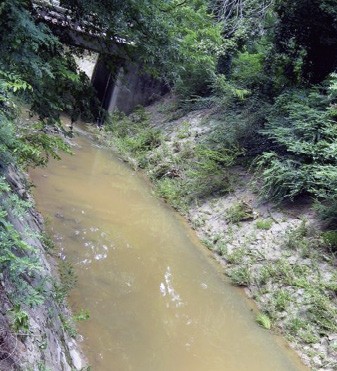 naomi van tol
naomi van tol
A recent photo of a muddy Lick Creek, near the V&E Greenline.
When city officials sought to reassure Midtowners that they wouldn’t
notice a proposed 18-foot storm-water detention basin in Overton Park,
they cited a similar project at Christian Brothers University.
But that detention basin, currently under construction, has already
caught the eye — and nose — of local residents.
Usually, Lick Creek in Vollintine-Evergreen is crystal clear.
“Even though it’s an urban creek, it’s very clear water,” says
neighborhood resident Mary Wilder. “Probably about the first of June,
there would be episodic periods of brown water. Sometimes it was so
brown you couldn’t see the bottom of the creek and, normally, you
can.”
At the same time, Naomi Van Tol with the Citizens to Preserve
Overton Park noticed that the water in the park’s section of Lick Creek
smelled distinctly like sewage.
Van Tol and Wilder, both members of the Lick Creek Storm Water
Coalition, called the city’s storm-water division and reported the
problem.
“The last few rains were so heavy that it just became constant, and,
at that point, we figured it out real quick,” Wilder says. “I went over
to Overton Park where there’s a confluence of three bayous and creeks.
You can see the three inlets as they join together. One was clear,
another was clear, and one was full of mud.”
The ironical culprit: city construction to create a storm-water
detention basin on CBU’s soccer fields.
Because the project at CBU includes more than an acre of land, the
city’s engineering department was required to get a general
construction storm-water discharge permit from the state department of
environment and conservation (TDEC). The state then lends its authority
to the city to do inspection and enforcement.
“They had discharge of silt and soil from the large rain event
around July 17th,” says Scott Morgan, manager of the city’s storm-water
department. “They had erosion control problems in place before the
storm event. The rain essentially blew out their erosion control
measures.”
The city issued a Notice of Violation, or NOV, to the city
engineers, and Morgan says corrective action already has been
taken.
“They have a due date with the NOV. If corrective actions have not
been taken by the due date, we’ll do a follow-up inspection and fines
or environmental citations can be issued,” Morgan says.
TDEC’s Division of Water Pollution Control is currently completing
their inspection report and considering an additional NOV or
enforcement actions.